Some People Prefer to Eat at Restaurants While Others Prefer to Prepare and Eat at Home – IELTS Writing Task 2
Table of Contents
- Question
- Structural Breakdown
- Band 7 Sample Answer For Writing Task 2 Question – Some People Prefer to Eat at Restaurants While Others Prefer to Prepare and Eat at Home
- Band 8 Sample Answer For Writing Task 2 Question – Some People Prefer to Eat at Restaurants While Others Prefer to Prepare and Eat at Home
- Band 9 Sample Answer For Writing Task 2 Question – Some People Prefer to Eat at Restaurants While Others Prefer to Prepare and Eat at Home
- Connectors Used in the Above Sample Answers of Some People Prefer to Eat at Restaurants While Others Prefer to Prepare and Eat at Home
- Useful Links:

Limited-Time Offer : Access a FREE 10-Day IELTS Study Plan!
Since Writing Task 2 can be challenging for many IELTS candidates, practicing topics like, ‘Some people prefer to eat at restaurants while others prefer to prepare and eat at home’ will help you acquaint yourself with the format of structuring an IELTS Opinion essay. Also, if you want to practice regularly, check out the Writing Task 2 Practice Tests.
Let’s have a look at the Opinion essay – ‘Some people prefer to eat at restaurants while others prefer to prepare and eat at home.’ – with three expert-curated sample answers for different IELTS band scores.
Here are some Go-to strategies to solve questions like ‘Some people prefer to eat at restaurants while others prefer to prepare and eat at home’ with proper explanations!
Question
You should spend 40 minutes on this task.
Some people prefer to eat at restaurants while others prefer to prepare and eat at home. Which one do you prefer? Give reasons for your answer.
You should write at least 250 words.
Structural Breakdown
Type: Opinion Essay
Introduction
Body paragraph 1
Body paragraph 2
Conclusion
|
Band 7 Sample Answer For Writing Task 2 Question – Some People Prefer to Eat at Restaurants While Others Prefer to Prepare and Eat at Home
Eating habits vary greatly among individuals, with some favoring dining out at restaurants while others prefer the comfort of home-cooked meals. Personally, I lean towards the latter option for several reasons.
Firstly, cooking at home allows for greater control over ingredients and portion sizes. When preparing meals in my own kitchen, I can select fresh, high-quality ingredients, ensuring both the flavor and nutritional value of the dishes. Moreover, I can tailor recipes to accommodate dietary restrictions or preferences, such as reducing salt or incorporating more vegetables. This level of customization is often lacking in restaurant fare, where menu options may be limited or ingredients less transparent.
Additionally, cooking at home fosters a sense of creativity and experimentation. Rather than being confined to a predetermined menu, I have the freedom to explore new recipes, flavors, and cooking techniques. This not only enhances my culinary skills but also adds excitement and variety to mealtimes. Whether I’m attempting a complex dish from a cookbook or improvising with whatever ingredients are on hand, the process of cooking becomes an enjoyable and rewarding experience.
Furthermore, eating at home promotes a greater sense of connection and intimacy with loved ones. Sharing a home-cooked meal with family or friends creates a warm and inviting atmosphere, fostering meaningful conversations and bonding moments. It’s a time to slow down, savor the food, and appreciate each other’s company without the distractions often present in public dining spaces.
Despite these advantages, dining out at restaurants can offer convenience and a break from kitchen duties. However, the cost and potential health implications of frequent restaurant meals outweigh these benefits for me. Ultimately, the satisfaction and fulfillment derived from cooking and eating at home make it my preferred choice.
Vocabulary for Band 7
- Fosters: Encourages the development of something.
Example: Regular exercise fosters a healthy lifestyle.
- Customization: The act of making something to suit particular individual requirements.
Example: The company offers customization options for its products to cater to diverse customer needs.
- Transparency: Clarity or openness in actions or operations.
Example: The government promised greater transparency in its decision-making process.
- Culinary: Relating to cooking or the kitchen.
Example: The culinary school offers a wide range of courses on international cuisine.
- Intimacy: Close familiarity or friendship; closeness.
Example: The couple cherished the intimacy of quiet evenings spent together at home.
- Predetermined: Established or decided in advance.
Example: The itinerary included predetermined stops at various tourist attractions.
- Implications: Consequences or effects of an action or decision.
Example: The new policy had far-reaching implications for the company’s future.
- Distractions: Things that divert one’s attention from the matter at hand.
Example: The loud noises outside were constant distractions during the meeting.
- Satisfaction: The fulfillment of one’s wishes, expectations, or needs.
Example: Completing the project on time gave me a great sense of satisfaction.
- Fulfillment: The achievement of something desired, promised, or predicted.
Example: Pursuing his passion for painting brought him a deep sense of fulfillment.
Our expert IELTS trainers can evaluate your answers!
Get Evaluated for FREE!
Band 8 Sample Answer For Writing Task 2 Question – Some People Prefer to Eat at Restaurants While Others Prefer to Prepare and Eat at Home
The debate between dining out at restaurants and preparing meals at home is a nuanced one, with compelling arguments on both sides. While I acknowledge the convenience and social aspects of restaurant dining, my preference lies firmly with the experience of cooking and eating at home.
One of the primary reasons for my inclination towards home cooking is the emphasis it places on health and well-being. By controlling the ingredients and cooking methods, I can ensure that the meals I prepare are not only delicious but also nutritious. This proactive approach to health is particularly important in an era where processed foods and hidden additives are prevalent in many restaurant dishes. By cooking at home, I can prioritize fresh, whole foods and limit the use of unhealthy fats, sugars, and preservatives.
Furthermore, home cooking offers a sense of empowerment and self-sufficiency. Developing proficiency in the kitchen allows me to take charge of my diet and culinary choices, rather than relying on external sources for nourishment. Whether it’s mastering basic cooking techniques or tackling more elaborate recipes, the skills acquired through home cooking are invaluable and empowering.
In addition to health and empowerment, home-cooked meals also promote financial savings and sustainability. Dining out regularly can quickly add up in terms of expenses, whereas cooking at home is often more cost-effective. By buying ingredients in bulk, minimizing food waste, and utilizing leftovers creatively, I can stretch my food budget further without compromising on quality or flavor. Moreover, home cooking reduces reliance on single-use packaging and transportation, thereby lessening one’s carbon footprint and contributing to environmental sustainability.
Beyond the practical benefits, there’s a profound sense of satisfaction that comes from preparing a meal from scratch and sharing it with loved ones. The act of cooking becomes a labor of love, infused with care and attention to detail. Whether it’s a simple weekday dinner or an elaborate feast for a special occasion, the communal aspect of sharing homemade food fosters a sense of connection and belonging that is unparalleled.
While dining out certainly has its allure, with its convenience and social ambiance, the joys and rewards of home cooking far outweigh them for me. From prioritizing health and sustainability to fostering empowerment and connection, the kitchen has become a sanctuary where I can express myself and nourish both body and soul.
Vocabulary for Band 8
- Nuanced: Characterized by subtle distinctions or variations.
Example: The author’s nuanced portrayal of the characters added depth to the story.
- Proactive: Taking action to control or prevent a situation rather than just responding to it.
Example: The company implemented proactive measures to address customer complaints before they escalated.
- Proficiency: Competence or skill in a particular area.
Example: The candidate demonstrated proficiency in multiple programming languages during the interview.
- Empowerment: The process of becoming stronger and more confident, especially in controlling one’s life and claiming one’s rights.
Example: The organization’s mission is to promote the empowerment of marginalized communities.
- Invaluable: Extremely useful or indispensable.
Example: Her mentor’s guidance proved to be invaluable in navigating the challenges of starting a new business.
- Nourishment: The food or other substances necessary for growth, health, and good condition.
Example: The restaurant focused on providing nourishing meals made from locally sourced ingredients.
- Elaborate: Involving many carefully arranged parts or details; detailed and complicated.
Example: The chef prepared an elaborate seven-course tasting menu for the special occasion.
- Communal: Shared by all members of a community; for common use.
Example: The village had a communal garden where residents could grow fruits and vegetables together.
- Unparalleled: Having no equal; unmatched or unrivaled.
Example: The artist’s talent was unparalleled in the contemporary art scene.
- Sanctuary: A place of refuge or safety.
Example: The library became her sanctuary, where she could escape into the world of books.
Aspiring to Crack IELTS Writing?
Get expert help today with a FREE demo session! Sign up, Now!
Band 9 Sample Answer For Writing Task 2 Question – Some People Prefer to Eat at Restaurants While Others Prefer to Prepare and Eat at Home
In the ongoing debate between dining out at restaurants and preparing meals at home, I staunchly advocate for the latter, finding profound fulfillment and multifaceted benefits in the act of home cooking.
At the heart of my preference for home cooking lies a deep appreciation for the holistic approach it affords towards health and well-being. By meticulously selecting fresh, unprocessed ingredients and employing cooking techniques that preserve nutritional integrity, I am able to craft meals that not only tantalize the taste buds but also nourish the body. This conscientious approach to nutrition transcends mere sustenance, serving as a cornerstone of preventive healthcare and holistic wellness.
Moreover, home cooking cultivates a profound sense of connection—to oneself, to loved ones, and to the wider community. The act of preparing meals from scratch is imbued with mindfulness and intentionality, fostering a deeper understanding of ingredients, flavors, and cultural culinary traditions. Beyond the confines of the kitchen, sharing home-cooked meals becomes a ritual of communion, fostering bonds of kinship and solidarity that transcend the transient pleasures of restaurant dining.
In addition to its intrinsic value in promoting physical and emotional well-being, home cooking also confers practical advantages in terms of financial prudence and environmental sustainability. By eschewing the often exorbitant costs and environmental toll associated with dining out, home cooks can exercise greater fiscal responsibility while minimizing their carbon footprint. Furthermore, the practice of meal planning, batch cooking, and resourceful utilization of leftovers not only reduces food waste but also fosters a deeper appreciation for the intrinsic value of sustenance.
While I recognize the allure of dining out—its convenience, its social cachet—my allegiance remains steadfast with home cooking, a practice that embodies the ethos of mindfulness, creativity, and interconnectedness. In a world increasingly characterized by haste and transience, the kitchen emerges as a sanctum of sustenance and serenity, where the alchemy of home cooking transmutes the ordinary into the extraordinary.
Vocabulary for Band 9
- Staunchly: Firmly committed or loyal to a particular cause or belief.
Example: She remained staunchly devoted to her principles even in the face of criticism.
- Holistic: Characterized by the treatment of the whole person, taking into account mental and social factors, rather than just the symptoms of a disease.
Example: The holistic approach to healthcare emphasizes the importance of addressing both physical and psychological well-being.
- Tantalize: Tease or torment with the sight or promise of something that is unobtainable or forbidden.
Example: The aroma of freshly baked bread tantalized her senses as she passed the bakery.
- Imbued: Inspire or permeate with a feeling or quality.
Example: The novel is imbued with a sense of nostalgia for a bygone era.
- Communion: The sharing or exchanging of intimate thoughts and feelings, especially when the exchange is on a spiritual level.
Example: The retreat provided a space for deep communion with nature and self-reflection.
- Eschewing: Deliberately avoiding or abstaining from.
Example: He eschewed material possessions in favor of a minimalist lifestyle.
- Exorbitant: Unreasonably high; excessive.
Example: The hotel’s room rates were exorbitant during the peak tourist season.
- Solace: Comfort or consolation in a time of distress or sadness.
Example: Music provided her with solace during difficult times.
- Alchemy: A seemingly magical process of transformation, creation, or combination.
Example: The artist’s paintings were described as a visual alchemy of light and color.
- Sanctum: A private place where one is free from intrusion; a sacred or holy place.
Example: The library was her sanctum, a quiet refuge from the chaos of daily life.
Connectors Used in the Above Sample Answers of Some People Prefer to Eat at Restaurants While Others Prefer to Prepare and Eat at Home
Connectors, also known as connectives or transition words, are words or phrases that link ideas or parts of a sentence or paragraph together. Here are some of the connectors used in the above sample answers:
- Moreover
- Furthermore
- In addition
- Beyond
- While
- Moreover
- Furthermore
- Beyond
- While
- While
- In addition to
- Furthermore
Read More Essays like ‘Some People Prefer to Eat at Restaurants While Others Prefer to Prepare and Eat at Home – IELTS Writing Task 2’ given below.
Remember to proofread your essay for grammar, vocabulary, and spelling errors. These tips, combined with practice, will help you write well-structured and coherent IELTS Writing Task 2 Opinion essays like the ‘Some people prefer to eat at restaurants while others prefer to prepare and eat at home – IELTS Writing Task 2.’
Useful Links:
- In some countries, using the internet in schools is getting more popular – IELTS Writing Task 2 Practice Test 18
- IELTS Writing Task 2 Opinion Essay Topic: The Best Way to Help Underachieving Pupils
- Teamwork Offers A Lot Of Benefits In The Modern Society-IELTS Writing Task 2 Opinion Essay
- Road Safety – IELTS Writing Task 2 Argumentative Essay
Frequently Asked Questions
What are the different types of essays in IELTS writing task 2?
What is the structure of an IELTS essay?
What is paraphrasing and how important is that skill in writing task 2 of IELTS?
What is coherence and cohesion in IELTS writing task 2?
What is collocation and what role does it play in IELTS writing task 2?
Practice IELTS Writing Task 2 based on Essay types

Start Preparing for IELTS: Get Your 10-Day Study Plan Today!
Explore other Advantage Disadvantage Essays
Recent Articles
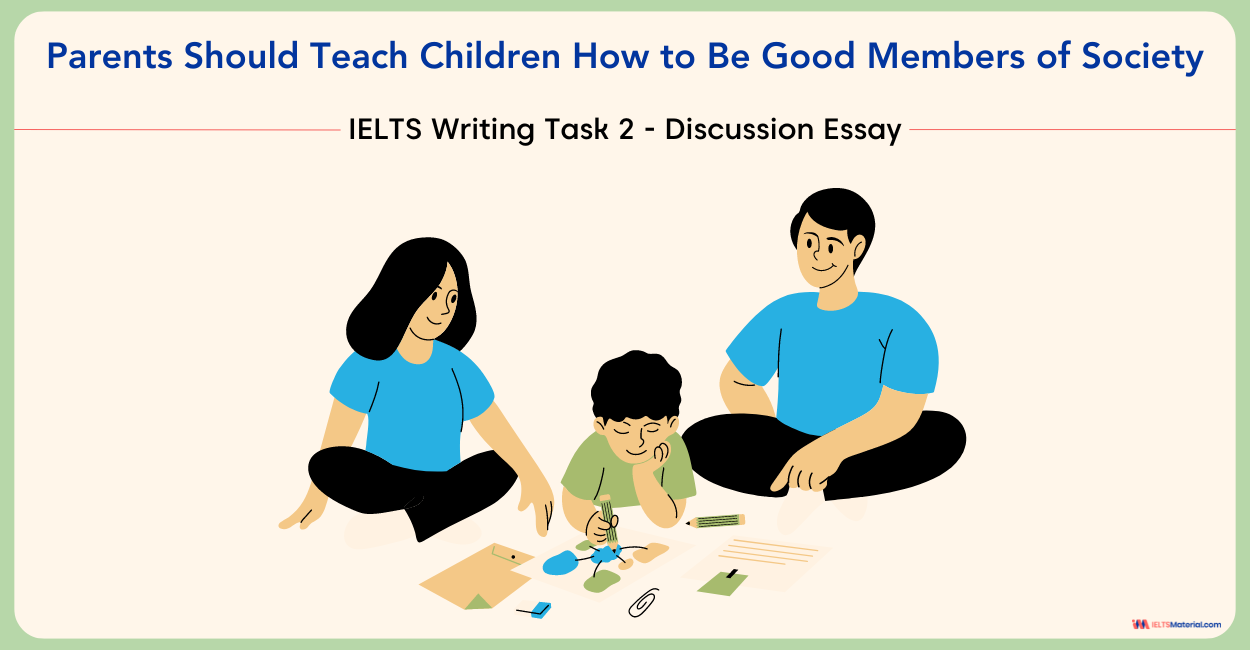
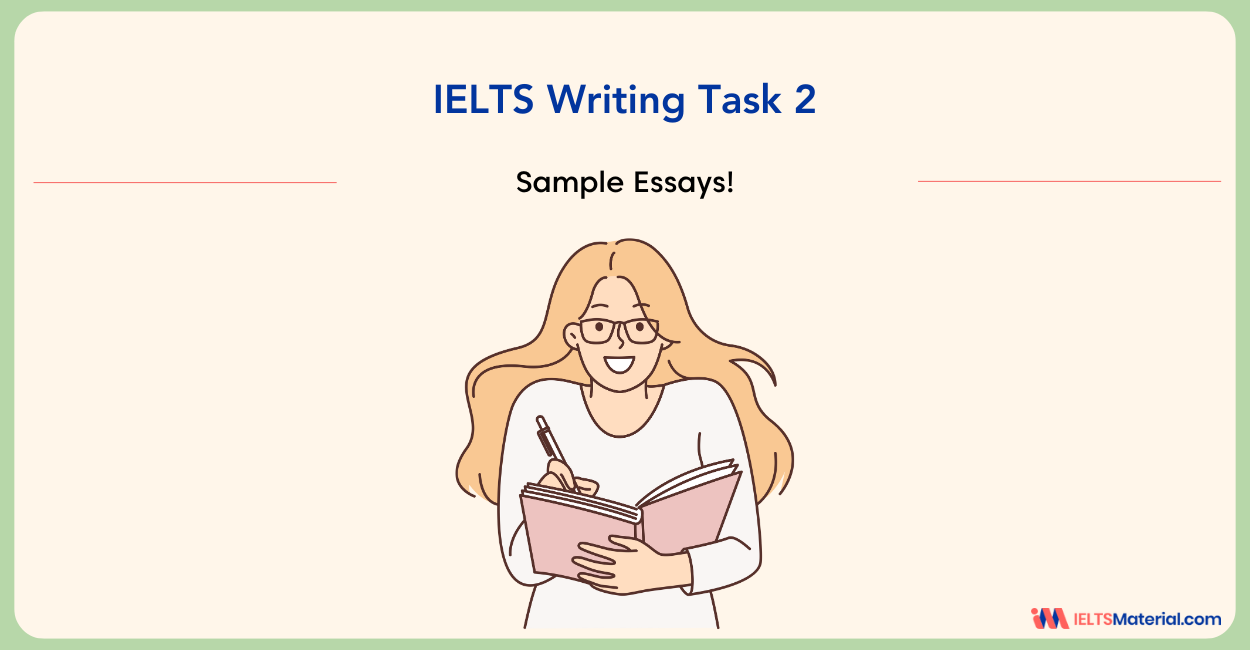
Raajdeep Saha

Kasturika Samanta
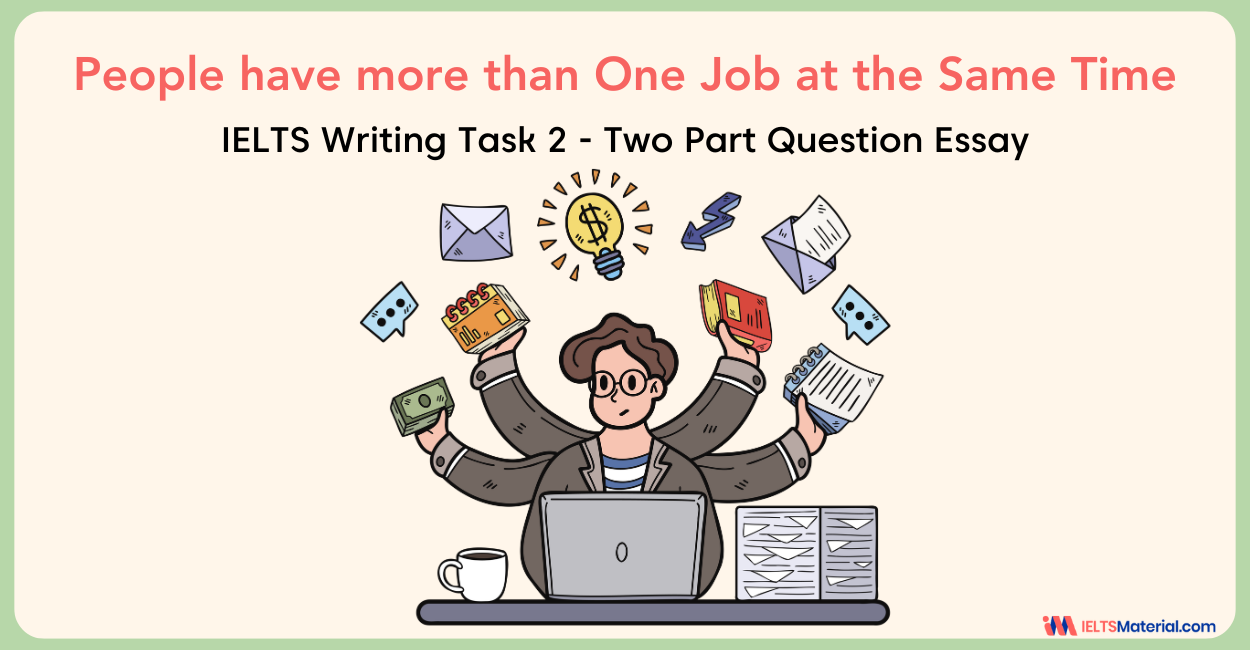
Akanksha Tripathi
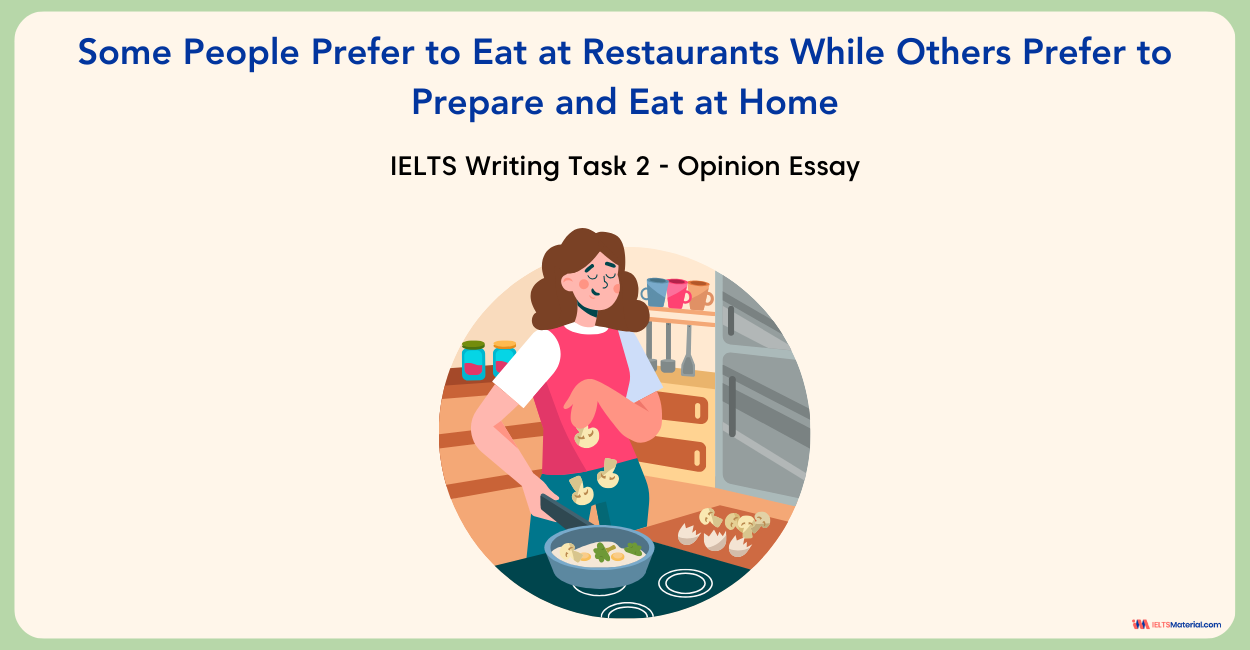

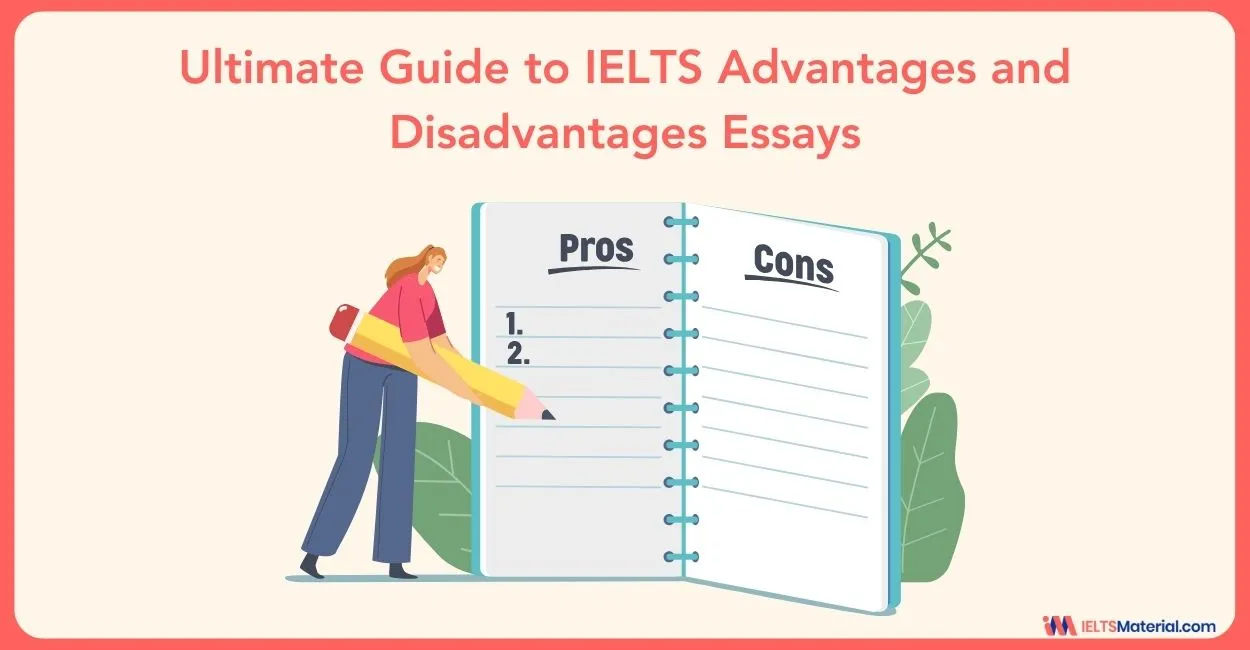


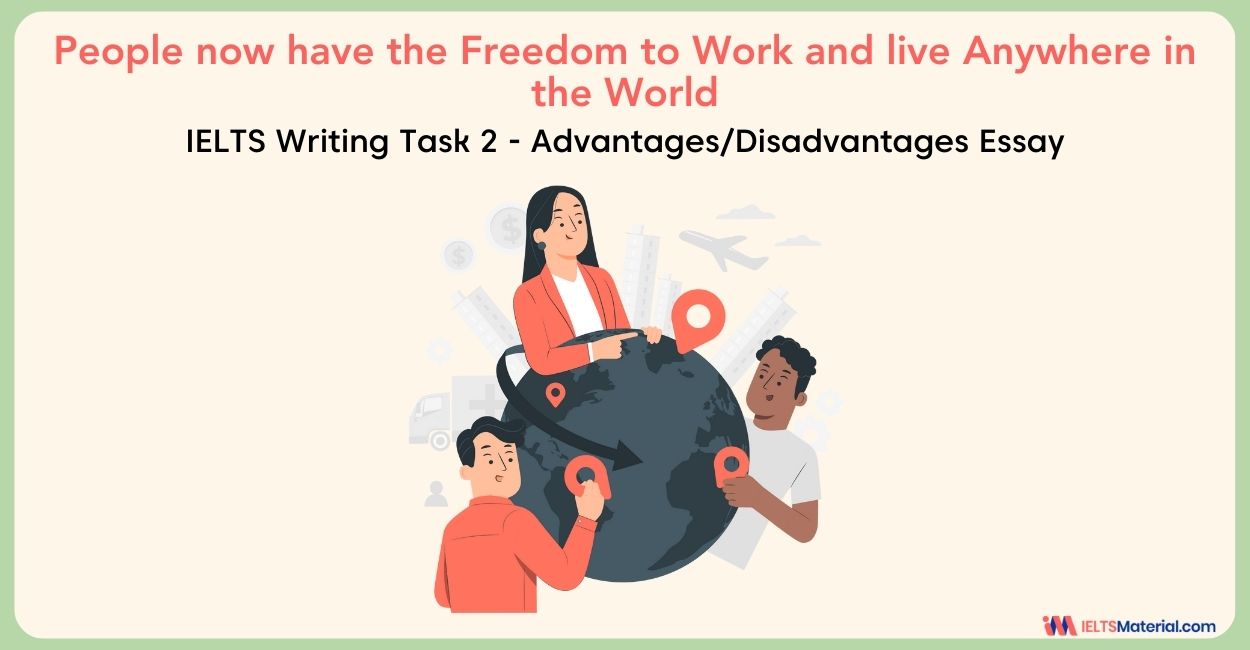


Post your Comments
3 Comments